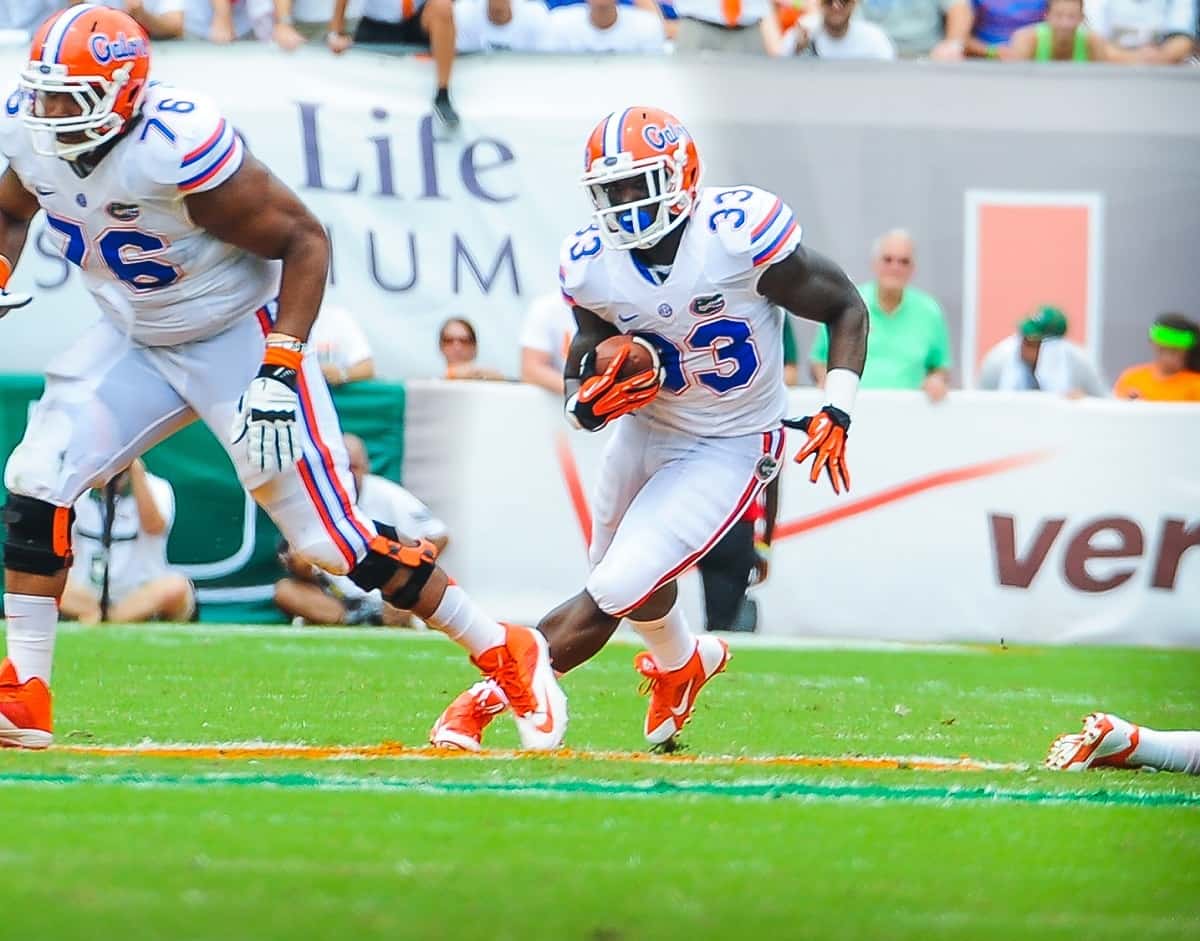When Florida faces Tennessee on Saturday, the Volunteers will face a totally different offense from the one they were blitzkrieged by in Eugene last weekend. The Oregon Ducks racked up 59 points and 687 yards of total offense with their lightning quick hurry-up offense.
Pace of play is the hot topic in college football these days, coming into this season, Auburn head coach Gus Malzahn and Arkansas head coach Bret Bielema went after each other in the offseason about the en vogue style of offense sweeping the nation. Alabama head coach Nick Saban also voiced concern about the tempo harming players during games at SEC media days in July.
…I don’t have the answer to this, is an increased number of plays that players play in the game, is there any safety issues in that? They play like 64 plays a game in the NFL. We play over 80 in college. The up‑tempo teams play even more than that. The cumulative effect of that is a player is playing 25, 30 more plays a game. Is there any safety issues in that? I don’t know the answers. I think these are the questions that need to be asked to know whether there needs to be any rules that affect the tempo of the game.
The main place the fast pace offense harmed Tennessee last Saturday was on the scoreboard, but it shouldn’t be a concern for the Volunteers in The Swamp this weekend, because Florida is not that type of team.
Week two against Miami, Florida ran 77 offensive plays, Oregon ran 76 against Tennessee. Almost an identical number of plays, but it’s the amount of time each team went about their business and most importantly, at what rate each team ran their plays that is the most telling about their style.
Florida controlled the clock against Miami to the tune of 38:20 in time of possession. Juxtapose that with Oregon, who only needed 25:48 to amass 82% of Florida’s yardage output in two games this season and you see the power of the hurry-up ran at the highest level. The Ducks got a play off every 20.29 seconds against the Volunteers. The Gators won’t do that on Saturday, in fact, if Florida is able to get an early lead, they won’t even come close to that pace of play.
Against Miami, the Gators ran a play every 29.87 seconds. The reason for that may have been because Florida was playing from behind and were desperate towards the end instead of trying to bleed the clock to extend a lead in the fourth quarter. Their time of possession against Miami was 1:28 less than against Toledo, and in that game — one they never trailed — they ran a play every 33.54 seconds against the Rockets. Florida also threw the ball 11 more times against the Hurricanes than they did against the Rockets, with six more incompletions — incompletions stop the clock. The Gators also ran less plays — 70 — in week one while using more clock.
The Gators choose to play about as slow as possible, but why?
“You have to understand how [Oregon has] built this thing for the last five to six years. Their kids and how dialed in they are. It’s tough for us to say ‘that’s us’ all of a sudden,” Florida offensive coordinator Brent Pease said. “Is using some tempo something that we practice, yeah, there’s always that possibility. But to do it how they’re doing it, I don’t think efficiency wise we’re built that way right now.”
Pease reiterated the reason for Florida’s pace when asked the question again.
“Our efficiency is going to be more grinding it out a little bit more and trying to create some big plays throwing the football,” Pease said.
That’s the bottom line, and it’s not something Florida fans might not want to hear. This team isn’t built to run like Oregon does. It’s a tough pill to swallow for fans, but at the end of the day the job of a coach is to put his team in the best situation to win, and right now, for Florida, the plan on offense is to eat up as much time as possible and move at a glacial pace. Get the lead and park the bus.
Will Florida ever run an up-tempo offense? Probably not, and that’s not just because of personnel, but because of philosophy. The Gators have a coach in Will Muschamp that is hell-bent on a physical brand of football, maybe they could run a hurry-up like Oregon in a few years, but they aren’t going to recruit the type of team that runs that type of system.
It starts up front, Oregon has three offensive linemen on their listed roster that weigh over 300 pounds, and their biggest is 312 pounds. Florida on the other hand has 11 300-pounders on their roster. Teams don’t run at an exhausting pace with big linemen, it takes smaller agile guys that don’t need as much time between plays to regain their wind. 360-pound Trenton Brown is not going to survive at a school that wants to be the fastest team in college football. It’s an overlooked aspect of the hurry-up, but weight matters.
So what Florida has, and what Tennessee will face Saturday will be slow — intentionally slow. That’s the way this team is setup and that’s the way the coaches have determined gives them their best chance to win and when it’s all said and done, isn’t winning what really matters, no matter what pace it’s set to?


